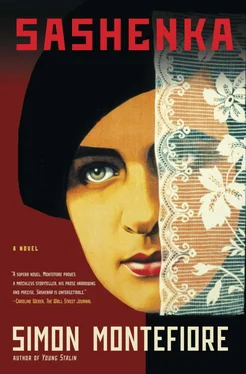Sashenka was wearing a pink cotton summer dress. She had had her hair styled recently, slightly curled at the front, arranged the new way in a permanent wave, and her face was made up. She drew herself up to her proudest.
“Comrades, sorry to have kept you. Have you been waiting long? I am Sashenka Zeitlin-Palitsyn, whom Lenin called Comrade Snowfox.”
“Well, comrade, what a nice welcome,” said Commissar-General of State Security (Second Degree) and Deputy People’s Commissar NKVD Bogdan “the Bull” Kobylov. “You know Comrade Beria is an admirer of yours?”
Sashenka took a deep breath, nostrils flaring, grey eyes narrowed.
“I’ve been expecting you any minute. I’m almost pleased…”
“Now I see why Comrade Beria speaks so highly of you,” he said.
Like many oversized men, his voice was mellifluous, almost effete. Sashenka despised him. She thought of her children far away—they had been gone for three nights now. She knew that within minutes she would be stepping off the edge of the world but she remembered what she had to do. She coolly took out a cigarette and held it out like a film star. Kobylov, fluttering his rings on amber-skinned fingers, leaned over and lit it for her. She could smell his oily flesh—and those cloves.
“Thank you, comrade.” She inhaled, closing her eyes and blowing out the blue smoke. Someone was playing the piano in a nearby apartment and a child was singing, a family in a normal world. “What do you want?”
“When it’s a pretty woman,” said Kobylov, wrinkling his nose at her, “I like to come and get her myself.”
A thousand miles to the south in the small city of Tiflis, a grey-haired woman was packing an overnight bag. She lived alone in a single room, close to the city center, down a dark, overgrown lane just below the sulphur baths, the old town and the Orthodox church with the round Georgian tower.
Her tiny room, which contained a bed, a lamp, a wardrobe and old photographs of a rich family, all waxed mustaches, bowler hats, sailor suits and shiny limousines, was in an elegant mansion, once the property of a line of Georgian princes, the last of whom had been an eccentric antiquarian, book collector and owner of the sulphur baths. (He was now a taxi driver in Paris.) At the time of the 1905 revolution, he had sold the palace to a Jewish oil magnate based in St. Petersburg. Now the mansion was divided up into small apartments and the princely library on the ground floor was a café, a flamboyant venue of a kind that no longer existed in Moscow or anywhere in Russia proper. But here in Georgia, despite the recent killings that had decimated the intelligentsia, this curiosity shop of a café, with its damp old books, candlesticks overflowing with wax and dense, curling vines covering its steamed-up windows, still prospered, serving Turkish coffee and Georgian dishes.
The grey-haired lady worked in the café all day as a waitress. It was not well paid but it was a decent job for those times; she had the correct papers; it was all legal. She kept herself to herself, never chatted with customers or even with the other waitresses, who had given up gossiping about her. It was clear that she was a bourgeois and that she did not belong there, but provincial cities in those days were full of such flotsam and Georgia was more tolerant than anywhere else. It was said that Communism did not extend much beyond the limits of the capital. She had once lived with an older man but he had gone and she showed no interest in discussing her private life.
The waitress’s Russian was excellent, her Georgian more than adequate, but she spoke both with an accent. She was polite to everyone but they noticed she reserved her real solicitude for the library itself. The kitchen and bar had been jerry-built between two bookcases at the end of the dark old room. The humidity of the kettles and cauldrons had rotted the woodwork; the books were peeling and warping; the old pictures were mildewed and yellowing—but she did what she could, dusting the books, sometimes drying them out in her own room upstairs.
On the previous day, the woman had asked for a week off, something that had never happened before. But she had years of unused vacation, so Tengiz, the manager, gave her two weeks instead.
Today, she rose very early and walked across Beria Square to the Armenian Market, where she bought provisions. Returning to her room, she filled her suitcase not only with clothes but also with a bag of flat Georgian lavashi loaves, cured meats and candies. Taking a photograph of an awkward schoolgirl in the uniform of a Tsarist boarding school off the wall, she removed its back and took out some notes. She hid two hundred rubles in her girdle, kissed the photograph and replaced it on the wall.
She checked herself in the mirror and tutted: those apple cheeks in that heart-shaped face were now weathered and coarsened; there were bags under her eyes; and her clothes were dignified but frayed at the edges. She looked fifty but she was younger. How on earth, she asked herself, did you end up here? She shook her head and smiled.
A few hours later she caught the streetcar to the station, where she bought a ticket to Baku and from there to Rostov-on-Don. She changed at Baku Station, a place teeming with Muslims, Turks and Tartars in Soviet uniforms, skullcaps and robes, carrying chickens and sheep and children. One family offered her some Turkish plov, cold lamb stew, and she was grateful. She waited for her train. When it was called, it seemed that the entire station charged at it but her Turkish friends helped her and pulled her up into their carriage. She sat close to them and was again grateful for their protection. On the train, she tried to sleep but could not stop reflecting on the strange events of the previous week.
Four days earlier, a sweaty official in a Party tunic had arrived to inspect the residence and work permits of the employees at the café. All were asked to go to the Party Headquarters, the old Viceroy’s Palace, on Beria Boulevard to have their papers checked. Tengiz told her she was to go first. This was odd but one did not ask questions: checks, cleansings and purges were part of everyday life. Her husband was already gone, certainly dead; and she had been expecting them to come for her. Surely she would be arrested and vanish in her turn. Well, did it matter anymore?
The woman tramped up the hill to the splendid white Viceroy’s Palace, from where the First Secretary ruled Georgia. The wait made her very anxious. There were many questions she longed to ask. But like everyone else, she was helpless before the clumsy and colossal state. Questions from you could lead to questions about you—it was better to keep your head down. She waited like the other coughing, scratching, grunting, depressed people, old and young, in the filthy anteroom with its battered wooden window.
When it was her turn, she passed her papers through the hole. She was then called through into a grubby, unpainted office. She braced herself for the rude tyranny of some minor Georgian bureaucrat. But the official who awaited her was not that type at all. A slim and handsome man, clearly a Party boss, stood up when she came in, drew out a chair for her and then took his place behind the desk. His Stalinka tunic fitted his broad shoulders and slim waist perfectly. He radiated the energy of the Stalin generation and appeared much too sophisticated to belong in this chipped office. He must be a Muscovite, a potentate, she thought. Yet his blue eyes were bright, questioning.
“Audrey Lewis?”
She nodded.
“Don’t be nervous. I’ve always known you were here in Tiflis. Do you remember me?” he asked. “I saw you long ago in St. Petersburg. The house on Greater Maritime Street, the day Sashenka’s mother died. Three comrades came to collect her that day. One was her uncle Mendel. The second was Vanya. I was the third. Now, Lala, there is something I want you to do.”
Читать дальше












